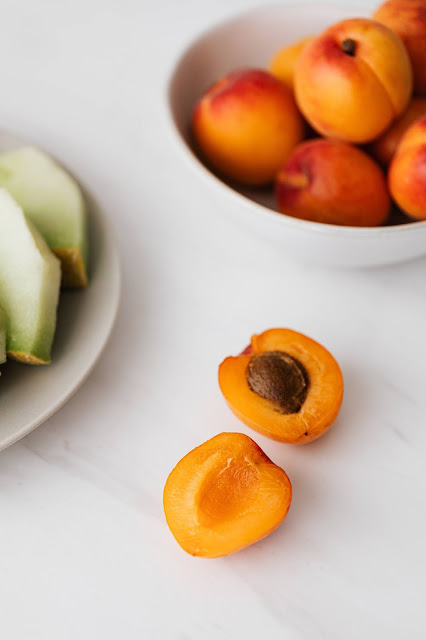Apricots are the yellowish-orange fruits that belong to the family of Rosacea. Other fruits that belong to the same family are peach, pear and apple. In appearance and size, Apricots are small in size. They are covered with a velvet-like skin which is smooth in its texture.
Apricots are those beautifully orange colored fruits full of beta-carotene and fiber that are one of the first signs of summer. Although dried and canned apricots are available year-round, fresh apricots with a plentiful supply of vitamin C and are in season in North America from May through August. Any fresh fruit you see during the winter months have been imported from either South America or New Zealand.
--- Prunes and dried apricots are excellent sources of dietary fiber. They’re especially rich in soluble fiber, the type that dissolves into a gel-like substance and binds to fatty acids to encourage their excretion in waste. This is the quality that gives soluble fiber its ability to reduce high LDL and total cholesterol levels. Both dried fruits also provide appreciable amounts of soluble fiber, which promotes healthy bowels by adding bulk to stools and moving material through the digestive tract more quickly. A half-cup serving of dried apricots provides 19 percent of the daily value for fiber, while 1/2 cup of prunes contains almost 25 percent, according to the U.S. Department of Agriculture.
--- Fruits like apricots and those belonging to the same family are high in potassium contain. High levels of potassium are extremely beneficial to your body. When potassium combines with sodium or salt, it regulates the water levels within and between cells. A good amount of potassium is also required to keep the blood pressure level stable. Deficiency of potassium is known to be deterrent to the body as it increases the possibility of developing hypertension. Hypertension, in its most severe forms can lead to the possibility of heart attacks. Eating half a cup of apricots is enough to give you a whopping 21% of your required potassium intake every day.
--- Apricots are rich in other antioxidants, too, including polyphenolic antioxidants like flavonoids. Diets rich in flavonoids and the other types of polyphenols found in apricots have been linked to reductions in heart disease in humans, as well as other potential health benefits.
Antioxidants are responsible for some of the specific effects listed below, but those only scratch the surface of the potential health benefits of diets rich in these important nutrients. Here are a few of the important antioxidant nutrients or nutrient groups found in apricots:
Quercetin
Proanthocyanidins
Catechins
Epicatechins
Hydroxycinnamics
Gallic acid
Caffeic acid
Coumaric acid
Ferulic acid
How can you tell when apricots are ripe? One sign: the fruit is soft but not too soft; otherwise it may be overripe. Consider when you plan to eat or cook the apricots, and let that determine what's too firm or soft. Learn more about how to store apricots.



No comments:
Post a Comment